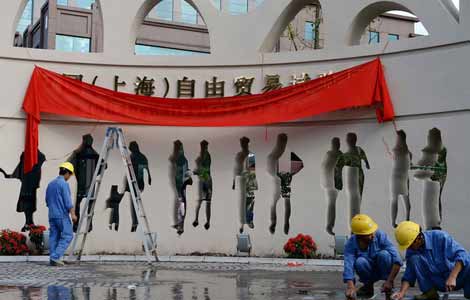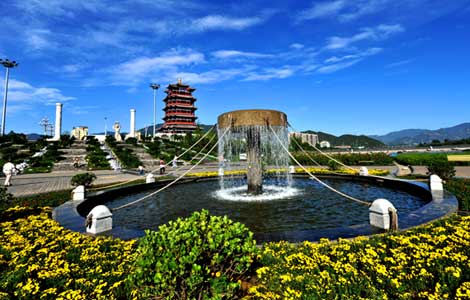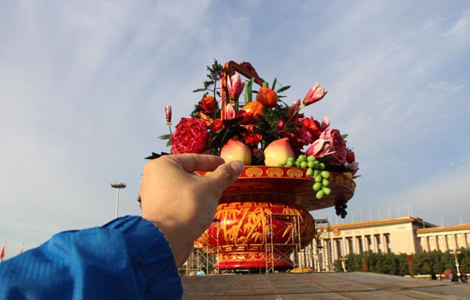Making a big push in China's low-carbon drive
Updated: 2013-09-25 13:58
By He Yini (chinadaily.com.cn)
|
||||||||
An idea in the abstract may thrill its creator, but an idea that has been tested by reality - and survives - can change the world. That's especially true for China Inner Mu Biomass Power Co Ltd, a private Chinese company dedicated to integrating desertification control with biomass thermoelectricity in China.
The company has been a pioneer in the field since 2003. It came up with a new economic model four years later when it started to pay local people to plant Salix psammophila, which is widely known as "a green coal" with much cleaner emissions and thermo capacity when burned.
According to Li Jinglu, chairman of China Inner Mu Biomass Power Co Ltd, the company has poured about 700 million yuan ($114.4 million) so far into afforestation and power plants in the Inner Mongolia autonomous region.
It has greened an area of as much as 24,000 hectares and generated 450,000 kilowatt-hours of biomass electricity over the past six years, creating more than 5,000 jobs on average every year.
In an effort to win wider support and promote woody biomass energy development, the company on Aug 12 jointly launched the International Three-Carbon (carbon emission reduction, sequestration and capture) Green Energy Base Project in Beijing in partnership with the International Energy Conservation Environmental Protection Association (IEEPA) and the United Nations Industrial Development Organization (UNIDO).
The project is set to build a demonstration base encompassing forest carbon sequestration and desertification control, biomass power generation and spirulina cultivation simultaneously.
"Normally, spirulina cultivation uses carbon dioxide released from dissolving lime stones. But here we are capturing carbon emitted from burning Salix psammophila, which largely brings down carbon emissions in the process," Li explained.
He said spirulina produced by his company will hit the market next year, adding that carbon emissions will decrease along with increased sales of spirulina, a widely-acknowledged high-protein health-care product.
"The company is creating a new economic model that is able to help protect our environment by reining in desertification and cutting carbon emissions, while earning money for private companies," said Edward Clarence-Smith, representative of the UNIDO in China. "If successful, it could actually kill two birds with one stone."
China's carbon emissions have reached about 8 billion tons in 2012, taking up nearly 40 percent of the global total of 31.6 billion tons, according to He Jiankun, president of the Institute of Low Carbon Economy of Tsinghua University.
"The social benefits are huge; there's no doubt about that. But in order to make it sustainable, the company has to find a way to make money at the same time because in the end, it's the survival of the fittest," He added. "It would be very hard to make it without the full support of the Chinese government."
The company is expecting a break-even balance sheet next year given the fact that the market is starting to recognize the company and its products, cutting the company's deficit to about 10 million yuan this year from 40 million yuan four years ago.
"Although the company has been losing money these years, we are optimistic it will soon be out of the red, making money once the market rises," Li added. "The road is really rough in the first few years, but I believe the future is bright."
"The good thing about the new economic model is that it could subject desertification control to market forces and incubate a large industry in years to come," said Li.
China has stepped up its efforts in pushing the country's green shift, vowing to raise the total output of environmental protection industries to 4.5 trillion yuan by 2015, an average annual increase of 15 percent, an industrial development plan announced last year.
According to an earlier report by Xinhua News Agency, the State Council announced measures on August 11 to boost green industries as it looks to increase domestic demand and update the country's economic structure.
"All is still at its infancy and the road ahead is bumpy. But if we can work out an effective mechanism that considers the stakes of local people, the company and the local government, it could not only be 'mission possible' but could also bring in huge profits both for the company and society," said Liu Yanhua, former vice-minister of the Ministry of Science and Technology.
- TMO secures biomass feedstock supply for Chinese plant
- China to build Singapore's biomass-solar power plant
- Desertification threatens Qinghai-Tibet Railway
- China to spend 1b yuan to preserve major riverhead
- Afforestation area increases to 6m hectares
- China to expand forest coverage to 21.66% by 2015

 World leaders at UN General Assembly
World leaders at UN General Assembly
 China to inaugurate Shanghai FTZ on Sept 29
China to inaugurate Shanghai FTZ on Sept 29
 China's investment a 'job-saver' in Europe
China's investment a 'job-saver' in Europe
 Pollution control plan to slash PM2.5
Pollution control plan to slash PM2.5
 The beauty and beasts of selling hot houses
The beauty and beasts of selling hot houses
 Tian'anmen's flowery moments for National Day
Tian'anmen's flowery moments for National Day
 When animals meet beer
When animals meet beer
 Microsoft revamps Surface to challenge Apple
Microsoft revamps Surface to challenge Apple
Most Viewed
Editor's Picks

|

|

|

|

|

|
Today's Top News
208 killed as quake hits SW Pakistan
Foreign Minister Wang makes the rounds at UN
China to surpass US as top trader
Smithfield voters approve deal
Ultra wealthy population shrinks in China: report
White House to enroll millions in Obamacare
Brazilian president blasts US for spying
Kenya mall siege 'over' but death toll unclear
US Weekly

|

|




